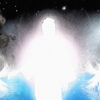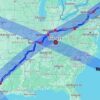While composing this article, Dr. Michael Heiser passed away from pancreatic cancer. I’m grateful for his ministry and how his content continues to help me understand the Second Temple understanding of God’s Word. Though I am sad, he has most definitely been made glad by His Savior and joined the divine council which he has spent his ministry helping us understand.
Did you know that the Bible gives us glimpses into the courts of Heaven and that in those glimpses, there seems to be a divine council? What do I mean by that? I mean that it’s an assembly of heavenly beings whom the LORD rules over and invites into cooperation to work out His plan. The concept is clearly present in the Bible, just not all in one place. It’s spread out in diverse passages in the Scripture. I mentioned this in my most recent teaching for the Hebrews study, so this article is the promised rabbit-hole article on the divine council.
I have to give credit up front. I draw heavily upon the work of Dr. Michael Heiser to talk about this. His book, The Unseen Realm, has been pivotal in my understanding of this concept. It is not a light read. I read it in 2018 over the course of about a month. Last year I began a much slower re-reading of the book. If you aren’t inclined to read books much, Dr. Heiser produced an Unseen Realm documentary that recently became freely available on YouTube. I’ll post it right here as well, in case you want to watch it right here, right now.
I can’t remember if Heiser says it in the documentary, but he says in the book that this concept is not new. In fact, Heiser is famous for saying that he has never had an original thought. He considers himself a glorified dot connector. And he’s right. The divine council concept is ancient. I had actually heard of it before I ever heard of the Unseen Realm. It’s been around at least since the intertestamental period. If you take the time to read The Unseen Realm, you’ll notice that it is footnoted to the nth degree. On some pages, the footnotes take up half the page. Heiser goes out of his way to demonstrate that what he’s teaching isn’t new.
What Heiser does is make a subject that has been relegated to the realm of scholars and academia and makes it accessible to lay persons. Anyone who’s interested can learn about this with relative ease because of Heiser’s work. And let me tell you, once you see it, you cannot unsee it. You’ll wonder why you’ve never seen it before. You’ll wonder why you’ve never heard it taught before because it is so plainly present in the text of Scripture.
[Everything I’m about to tell you is talked about in the documentary. So, you have my permission to stop here and watch. But if you’d rather not watch and hour-long documentary, then keep reading for a condensed discussion of the subject.]
The phrase, divine council, comes from the ESV translation of Psalm 82:1.
1 God has taken his place in the divine council;
in the midst of the gods he holds judgment:
– Psalm 82:1 (ESV)
Other translations say great assembly, heaven’s courts, divine assembly, and the congregation of the mighty, among others. Some translations downplay the supernatural nature of this verse by speaking of this as a human court, but most English translations lean into the idea of God’s heavenly court – His divine council. A simple look at the Hebrew reveals the supernatural aspect of this verse.
1 Elohim (God) has taken his place in the el adat (assembly of El);
in the midst of the elohim (gods) he holds judgment:
– Psalm 82:1 (ESV)
I’m not going to rehash what I already covered in The Enthroned Son, so if you haven’t read that, please do. What I want to do is cover the meaning of Psalm 82. Here’s the Psalm in its entirety.
1 God has taken his place in the divine council;
in the midst of the gods he holds judgment:
2 “How long will you judge unjustly
and show partiality to the wicked? Selah
3 Give justice to the weak and the fatherless;
maintain the right of the afflicted and the destitute.
4 Rescue the weak and the needy;
deliver them from the hand of the wicked.”
5 They have neither knowledge nor understanding,
they walk about in darkness;
all the foundations of the earth are shaken.
6 I said, “You are gods,
sons of the Most High, all of you;
7 nevertheless, like men you shall die,
and fall like any prince.”
8 Arise, O God, judge the earth;
for you shall inherit all the nations!
– Psalm 82 (ESV)
Here’s the nutshell: God is judging rebelling members of His divine council. He’s judging the gods. For what? Verses 2-5 describe that they have ruled unjustly and shown partiality to the wicked. Here is where we should back up a little for some context. First, when did the gods get rule over anyone? And, who are the gods? Deuteronomy has our answers.
8 When the Most High gave to the nations their inheritance,
when he divided mankind,
he fixed the borders of the peoples
according to the number of the sons of God.
– Deuteronomy 32:8 (ESV)
Before I dissect this verse, there’s a translation issue that I should address. Some English translations translate the last line of this verse as “according to the number of the sons of Israel.” The difference lies in the source material. The Masoretic Text (MT) of the Hebrew Bible says sons of Israel, while the older Dead Sea Scrolls (DSS) read sons of God and the Septuagint (LXX) reads angels of God. The ESV opts for the DSS because they are considerably older manuscripts than the MT. The DSS and the LXX reflect what first-century Jews and Christians would have read and, therefore, the way they understood the meaning of Deuteronomy 32:8. The reason for going with the DSS and LXX understanding will become clear as I dissect the verse.
When the Most High gave to the nations their inheritance…
This isn’t a good thing. We think of receiving an inheritance as something good. But in this case, it’s part of God’s judgment against the nations. He disinherited them by giving them what they want. Think of it like this. This has parallels to the Prodigal Son. I’m going to piece that together better once I’ve walked completely through the verse. For the moment, hold that thought.
When He divided mankind…
Prior to the days of Moses (because this verse is part of the song of Moses), when did the LORD divide mankind? It’s one of the go-to Sunday School lessons for kids.
8 So the LORD dispersed them from there over the face of all the earth, and they left off building the city. 9 Therefore its name was called Babel, because there the LORD confused the language of all the earth. And from there the LORD dispersed them over the face of all the earth.
– Genesis 11:8-9 (ESV)
Deuteronomy 32:8 is a call back to the events surrounding the tower of Babel. Let’s review the highlights of what happened there, according to Genesis. In Genesis 9, the LORD instructed Noah and his family to be fruitful and multiply and fill the earth (Genesis 9:1). But in Genesis 11, the descendants of Noah are doing the opposite. They were gathered in one place and worked together to build a city with a tower. It was rebellious against God’s command, plain and simple. They chose to disobey build a tower to ascend to heaven themselves and become gods. Genesis 11 tells us God judged their rebellion by confusing their language and dispersed them over the whole earth. And that’s essentially what we teach our children and what most believers believe about Babel.
Deuteronomy 32:8, though, gives us further insight into God’s judgment at Babel.
He fixed the borders of the peoples according to the number of the sons of God.
More than confusing their language, the LORD disinherited those nations that formed from Babel. What does that mean? He put them beneath the authority of the sons of God. If you are confused about the phrase sons of God, go and read my post about The Enthroned Son. God chose members of His divine council and gave them rule over the nations that formed from Babel. In essence, at Babel, the LORD said to humanity, I’m done with you; see how well these guys rule over you.
Hopefully it is clearer why the DSS and/or LXX are better choices for translation. The MT creates an anachronism (something out of sync with time) by saying sons of Israel. At Babel, there was no Israel. It’s commonly argued that the LORD could easily do this via His foreknowledge – which is true. But since the earliest manuscripts say sons of God, it is more likely that they more accurately reflect the ancient understanding of the Babel event.
Fast forward to Psalm 82. The LORD is pronouncing judgment on the sons of God – gods – to whom He gave authority to rule over the nations. This is the Second Temple understanding of Babel, Deuteronomy 32, and Psalm 82, in a very condensed nutshell.
The good news is that the LORD was committed to fulfilling His promise to Eve to crush the Serpent. Babel may have happened in Genesis 11, but the very next thing God did in the narrative was call – adopt – Abram in Genesis 12. This is also reflected in Deuteronomy 32:9.
9 But the LORD’S portion is his people,
Jacob his allotted heritage.
– Deuteronomy 32:9 (ESV)
Prodigal Parallels
The Prodigal Son (Luke 15:11-32) contains three primary characters: a father and two sons. The younger son rebels and asks for his inheritance so he could live his life his way. The Father gives him what he wants. Eventually the prodigal returns home to an overjoyed Father, but the older son who never left is jealous. The nations rebelled and the LORD let them go. Israel was his “firstborn” (Exodus 4:22) and was with the Father. Jesus shared this parable because the Pharisees were grumbling about His assocation with sinners. The sinners are the younger brother – the nations – and the Pharisees were the older brother – Israel. While the younger brother went out on his own, he was given over to the nations where he spent his money, and ultimatley became enslaved to them. The nations where the prodigal journeyed are analogous to the sons of God whom the LORD gave authority to rule, who enslaved the Gentiles and ruled them unjustly. Remember, these are parallels, and not every detail is a one-to-one analogy, but the metaphor at work in this parable broadly demonstrates the disinherited nations and foretells their return to the Father.
Conclusions
Now, this stirs up other questions that deserve answers. For the sake of this article’s brevity, I encourage you to view the video for a more comprehensive take on this subject. So, to wrap this subject up and perhaps whet your appetite for some more digging, here’s a bullet list about the divine council.
- God’s divine council is comprised of the sons of God – his created heavenly beings. (Job 1:6; Job 2:1)
- Satan was numbered in this council but rebelled.
- Other sons of God later followed Satan in his rebellion. (Genesis 6:1-4; Genesis 11:1-9; Deuteronomy 32:8)
- The sons of God from the Genesis 6 account have been imprisoned since the flood. (2 Peter 2:4; Jude 1:6)
- The judgment of the sons of God who had authority over the nations is pronounced in Psalm 82.
- Christ reclaimed all of the authority that He distributed to the sons of God via his death, burial, and resurrection. (Matthew 28:18-20)
- Pentecost is the first given sign that Babel is being reversed in Christ.
- Believers will replace the sons of God who rebelled in the divine council and judge them on the day of their final judgment. (1 Corinthians 6:3)
These bullet points go beyond what I covered, but as I said, I’m hoping to whet your appetite for digging a little deeper. I am indebted to Dr. Heiser for making this content accessible to lay people like myself. Thank you, LORD, for the servants you equip to help us along the way.













This is one of my favorite passages in times of despair and limbo. Verse 17 is so encouraging. God told…